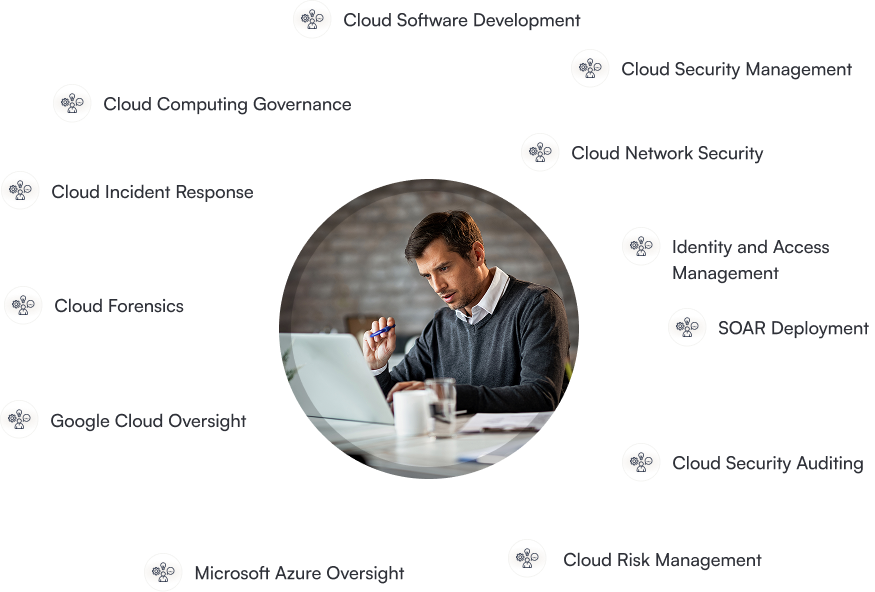DESIGNING AND IMPLEMENTING CLOUD SECURITY
10 Weeks
Duration
Thank you for reading this post, don't forget to subscribe!Online
Mode of Study
Certified Cloud Security Engineer (CCSE)
Certification
$465
Cost Per Credit Hour
Course Overview
This course helps you gain mastery in cloud-specific cyber threats and security strategies to become a highly skilled cloud security specialist. You’ll gain hands-on expertise in defending your organization’s cloud infrastructure (AWS, Microsoft Azure, and Google Cloud) by implementing cloud-based penetration testing and proactive incident response strategies, while taking on cloud forensic challenges and enforcing critical policies, standards, and regulations.
Acquiring in-demand cloud security skills and acumen will enhance your career prospects and earning potential. You’ll also boost your professional credentials with a valuable cybersecurity certification – (CCSE).


Admission Inquiry
Talk to Our Admission Counselor —we’re here to help you use your VA benefits
"*" indicates required fields
Highlights of This Course

Cutting-Edge Courseware
10 modules featuring immersive video lectures and digital books for an in-depth understanding of every topic.

Virtual Labs
Simulate real-world scenarios for hands-on practice with the latest cybersecurity tools.

Quizzes
Engaging quizzes after each module that measure and reinforce your knowledge of the topics covered.

Discussions
Interactive discussion boards where you exchange ideas and views on the course topics with your peers and professors.

Essential Tools
Software tools that enhance your learning experience, such as Grammarly.

24x7 Online Library
Round-the-clock online library with an expansive collection of free-to-use learning resources.

Cybersecurity Certification
Includes EC-Council's world-renowned Certified Cloud Security Engineer (CCSE) certification.
Why Pursue a Career in Cloud Security?
Market Growth
Soaring Demand
Earning Potential
Earning Potential

Weekly Modules
Week-1Module 1 – Enterprise Cloud Security & Penetration Testing
This module explores the fundamentals of cloud computing and the associated security challenges enterprises face. You will examine key cloud security objectives, such as data protection and access control, and understand how to identify and mitigate cloud-based risks. The module also focuses on comprehensive penetration testing for cloud infrastructures, enabling you to assess vulnerabilities in platforms like AWS, Microsoft Azure, and Google Cloud.
Week-2Module 2 – Securing Cloud Infrastructure & Data Centers
This module delves into securing cloud infrastructure and data centers, providing a comprehensive understanding of cloud computing fundamentals. You will explore key security objectives, including safeguarding data, managing access controls, and mitigating cloud-specific threats.
Week-3Module 3 – Cloud Application Security & Secure Development Practices
This module focuses on securing cloud-based applications and implementing secure development practices. You will explore fundamental cloud computing concepts, including deployment models and common threats, and understand how to address security risks during application development.
Week-4Module 4 – Cloud Data Security & Operations Management
This module focuses on ensuring data security in the cloud while managing cloud operations effectively. You will learn how to develop and implement cloud security programs that align with organizational standards, policies, and regulations.
Week-5Module 5 – Cloud Security Testing & Incident Response
This module provides a deep dive into cloud computer security testing and incident response. You will explore comprehensive penetration testing methodologies to identify vulnerabilities and secure cloud infrastructure. You’ll also learn about the importance of Security Orchestration, Automation, and Response (SOAR) tools in streamlining and accelerating incident response.
Week-6Module 6 – Cloud Forensics & Business Continuity
This module focuses on cloud forensics and ensuring business continuity during disruptive events. You will explore how to use Security Orchestration, Automation, and Response (SOAR) tools to accelerate incident response and improve forensic investigations in cloud environments.
Week-7Module 7 – Cloud Governance, Risk, and Compliance
This module examines the critical aspects of cloud governance, risk management, and compliance (GRC). You’ll develop cloud security programs that align with organizational standards, policies, and regulations. You’ll also identify and mitigate security risks while adhering to industry regulations and legal requirements.
Week-8Module 8 – Cloud Compliance, Auditing, and Legal Standards
This module covers the essentials of cloud compliance, auditing, and legal standards. It also highlights key legal frameworks, industry regulations, and compliance obligations that impact cloud operations. You’ll learn how to develop cloud security programs in line with organizational standards, policies, and regulatory requirements to ensure comprehensive risk management.
Week-9Module 9 – Applied Research Project
In this module, you’ll work on a hands-on applied research project focused on cloud security. You’ll select a relevant topic, conduct in-depth research, and apply theoretical concepts to practical scenarios within cloud environments.
Week-10Module 10 – ECCU Exam
The final exam module assesses your understanding of the concepts covered during the course. You’ll be evaluated on key topics like cloud security fundamentals, compliance, risk management, and incident response strategies.
What You Will Learn

- Cloud computing fundamentals
- Cloud security objectives and issues
- Penetration testing for cloud infrastructure security
- Security orchestration, automation, and response (SOAR) tools in incident response
- Cloud computing concepts
- Cloud deployment models
- Cloud computing threats
- Strategies to protect an organization’s cloud infrastructure from disruptive events
Virtual Lab Exercises

Get hands-on practice with state-of-the-art cybersecurity tools in simulations that mirror real-world scenarios. The virtual lab exercises included in this cloud security certification cover implementing secure deployments in GKE with binary authorization, restricting access to App Engine applications in GCP with Cloud IAP, creating secure EC2 instances in AWS Virtual Private Cloud (VPC), notifying security group change using CloudTrail and CloudWatch, forensically acquiring and examining VM in Microsoft Azure, and much more.
Skills You Will Gain


- Cloud Software Development
- Cloud Security Management
- Cloud Network Security
- Cloud Computing Governance
- Identity and Access Management
- SOAR Deployment
- Cloud Incident Response
- Cloud Forensics
- Cloud Security Auditing
- Cloud Risk Management
- Microsoft Azure Oversight
- Google Cloud Oversight
- AWS Oversight
Jobs You Can Prepare For
Total Course Fee
$1,395
- Cost Per Credit Hour: $465
- Technology Fee Per Term: $50
- Transcript Fee: $10 (plus shipping, if international)

Admission Criteria
- You must be aged 18 years or older.
- You must have a high school diploma (or equivalent), college degree, or relevant certification.
How to Apply
Step 01 :
Fill out the NDS application form and submit it to our Enrollment Advisor.
Step 02 :
Send us a scanned copy of your official government identification and documents showing proof of education.
Step 03 :
Pay the one-time $100 application fee.
Voices of Success: Hear from Our Alumni
Here’s what our students say about this course and how it helped advance their cybersecurity careers.

Frequently Asked Questions
How do I become a cloud security engineer?
To become a cloud security engineer, you must have a combination of education, experience, and specialized skills. Employers value professionals with a cloud-focused cyber security degree or the Certified Cloud Security Engineer (CCSE) certification from EC-Council University. Prior experience in cloud-based cyber security roles is also desirable for hiring managers. In terms of required skills, proficiency in AWS, Azure, and Google Cloud Platform (GCP) security, familiarity with tools like firewalls, intrusion detection systems (IDS), and security information and event management (SIEM) systems, and knowledge of scripting languages like Python and Bash can also help you get a high-paying cloud security job.
Does a cloud security engineer require coding skills?
Yes, coding skills significantly improve your effectiveness as a cloud security engineer and lead to more opportunities for future career advancement. If you want to develop the required coding skills, EC-Council University’s Designing and Implementing Cloud Security non-degree course is a great place to start.
Can I become a cloud security engineer with no experience?
You can still get a job in cloud security engineering even if you don’t have previous work experience in this domain. However, you will need to possess desirable qualifications, like the Certified Cloud Security Engineer (CCSE) certification from EC-Council University, to become an appealing candidate to potential employers. You will also need to demonstrate that you have the necessary skills and knowledge to succeed in this challenging field of cyber security.
